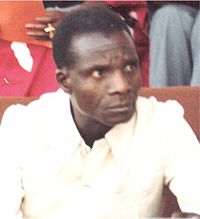Seyni Kountché
|
General Seyni Kountché |
|
|---|---|

Seyni Kountché in 1983
|
|
| Military General and 2nd President of Niger | |
|
In office April 17, 1974 – November 10, 1987 |
|
| Prime Minister | Mamane Oumarou (1983-7) |
| Preceded by | Hamani Diori |
| Succeeded by | Ali Saibou |
| Personal details | |
| Born |
July 1, 1931 Fandou, Niger, French West Africa |
| Died | November 10, 1987 (aged 56) Paris, France |
| Nationality | Nigerien |
| Political party | Military of Niger |
| Military service | |
| Allegiance | France Niger |
| Service/branch |
French Army Nigerien Army |
| Years of service | 1949–1961 (France) 1961–1987 (Niger) |
| Rank |
Sergeant (France) General (Niger) |
Seyni Kountché (1 July 1931 – 10 November 1987) was a Nigerien military officer who led a 1974 coup d'état that deposed the government of Niger's first president, Hamani Diori. He ruled the country as military head of state from 1974 to 1987. Stade Général Seyni Kountché, Niger's national stadium in Niamey, is named after him.
Born in 1931 in the town of Damana Fandou, the child of Djerma aristocracy who traced their origins to the Djermakoy Tondikandie, Kountché began his military career in 1949 serving in the French colonial army. In 1957, he was promoted to the rank of sergeant. The French territory of Niger became independent as the Republic of Niger on 3 August 1960. One year after his country gained its independence, Kountché transferred to the Niger Army. From 1965 to 1966, he studied at the officer's training school in Paris and became deputy chief of staff of the armed forces soon after. He was promoted to armed forces chief of staff in 1973.
During this same period, the newly independent country of Niger faced many problems. Politically, the nation was ruled as a one-party state led by president Hamani Diori. Opposition to the regime was suppressed, sometimes violently. A severe drought lasted from 1968 to 1974, leading to food shortages and growing dissatisfaction with the government. The economy remained weak despite attempts to exploit the large reserves of uranium in the country. Widespread civil disorder followed allegations that some government ministers were misappropriating stocks of food aid.
On 15 April 1974, Seyni Kountché led a military coup that ended Diori's rule. Kountché's first official acts were to suspend the Constitution, dissolve the National Assembly, ban all political parties, and release political prisoners. A Supreme Military Council (CMS) was established on 17 April 1974 with Kountché as president. Its stated mandate was to distribute food aid fairly and to restore morality to public life. A consultative National Council for Development (CND) replaced the National Assembly. Although political parties were outlawed, opposition activists who were exiled during Diori's regime were allowed to return to Niger.
...
Wikipedia
